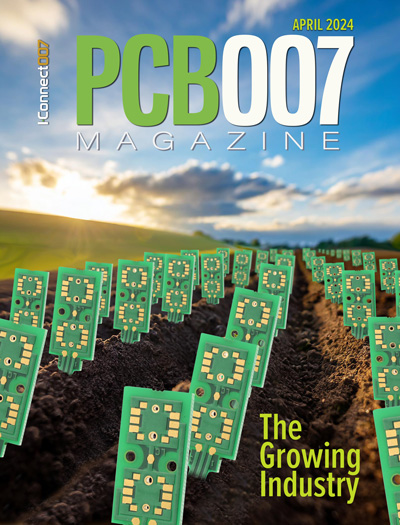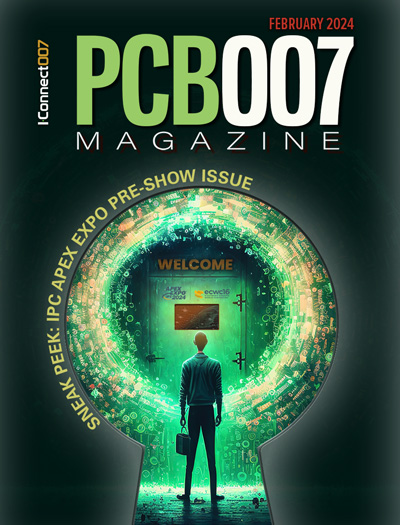-

- News
- Books
Featured Books
- pcb007 Magazine
Latest Issues
Current Issue
The Growing Industry
In this issue of PCB007 Magazine, we talk with leading economic experts, advocacy specialists in Washington, D.C., and PCB company leadership to get a well-rounded picture of what’s happening in the industry today. Don’t miss it.

The Sustainability Issue
Sustainability is one of the most widely used terms in business today, especially for electronics and manufacturing but what does it mean to you? We explore the environmental, business, and economic impacts.

The Fabricator’s Guide to IPC APEX EXPO
This issue previews many of the important events taking place at this year's show and highlights some changes and opportunities. So, buckle up. We are counting down to IPC APEX EXPO 2024.
- Articles
- Columns
Search Console
- Links
- Events
||| MENU - pcb007 Magazine
Graphic PLC…Are the Rumors True?
June 22, 2016 | Barry Matties, I-Connect007Estimated reading time: 11 minutes
During a visit to Europe recently, I met with Rex Rozario to get to the bottom of the rumors and speculation regarding the sale of his company, Graphic PLC.
Barry Matties: I was at the recent EIPC conference and rumors were swirling that Rex has sold out; he's just sitting around and counting his money.
Rex Rozario: A good thought, a good thought.
Matties: First, why don't you just give us a quick overview of what you've done with the organization here in England.
Rozario: All right, Barry. At the last meetings we had in China and here in England we discussed the future, where we could take this industry, and our visions for the future. That was staying in with the latest technology and looking at the world situation, the labor, and economics and deciding like we did in China, to consider automation. Of course we needed to expand for that, so the first stage was to expand our business, because we couldn't push the walls where we were. Then we utilized our large car park we had on site and put in a three-story building, as you just saw and photographed. Since the last meeting we have done all that. The general thought is we are here to stay. My life has been in printed circuit boards, and I'm hoping what we are creating here will be left well after my time—still trying to be in the lead and competing in a world market.
Matties: The rumors are that you’ve sold your business.
Rozario: Not quite. We’ve had a joint venture, as you know, for a while.
Matties: With the DSG factory.
Rozario: Dongguan Somacis Graphic in China, that was ten years ago. We have a very good working relationship. Now we have to expand, and we have to expand in China, with more buildings, and we have to expand here. I think it got to the point where we either had to go out and borrow a lot of funding, or look at a more realistic situation of sale to the holding company and then buyback.
Matties: Did you at all look at buying each other out? Was that even an option? Or was the partnership so solid you decided against that?
Rozario: No, the cash we were looking at from the outside was beyond raising ourselves. We felt sale and buyback was a better option. Hence, that's what we have done. Nothing has changed. We needed some cash and so we found Quadrivio Asset Finance SpA, an asset management company, but good, and very solid. They had lots of other companies that they had purchased. The main issue was that we still control and run these companies. The idea would have been to sell 50%, but it was a full sale, and we managed to buy back 47.5%.
Matties: You sold 100% of the company then. With your facilities in China, Italy, and some joint facilities between the two of you in California, you sold it all as one unit, but then in the same day, you bought back 47.5%.
Rozario: Yes, we're still controlling our company, and we're still doing exactly what we did.
Matties: Let's talk about what you mean when you say you still control the company. Obviously, on a percentage basis you don't, but you are talking about on an operating basis. The daily operations will look the same?
Rozario: It's the same management, and everything's the same. Obviously, when we do something like this, the assets are held in a holding company, which myself and other people, from our colleagues to our shareholders, get cash in our pocket to invest as we find the latest technology and latest machinery. Because our marketplace is growing, we are very busy; both parties are busy. China has always been very steady. We are on the high end of the marketplace, where we always feel you can sell technology. If you were just doing the bread and butter stuff, it's a very competitive market, and we couldn't have the cash to invest in what we are doing now. Our marketplace can be very competitive, overheads are different, so all companies are running autonomously without any close manufacturing association.
Matties: That raises a couple of thoughts. Initially, when you're one company and run autonomously, obviously there's going to be some consolidation of functions, just because of the nature of business, maybe in purchasing, payroll, or inventory control, and that sort of thing?
Rozario: Yes, but because we are in different countries and locations, with different overheads, we have always been self-contained. That will remain. There could be advantages in purchasing, for instance. That could be world sourcing. With the pricing structure, they're all different, because they're different currencies. So we're still competitive; we'll be competing with each other like we did along the way and giving the customer an opportunity to have a choice.
Matties: It will be interesting to see how that pans out. Let’s just go back a minute. Now that you're one company, what's the name going to be?
Rozario: Technically, we are not one company as such. We are still individual companies: Graphic PLC, Somacis, and DSG, under the umbrella of the holding company Fine PCB, SpA.
Matties: The names won't change?
Rozario: Nothing changed. The management is the same and the directors are the same. The only changes are at the top—the holding company. The technology is different, and the marketplace is different.
Matties: I think once the customers recognize this, they may say, "Why is the pricing different?" You're answering part of it with currency, overhead, and geographical influences.
Rozario: We have a 10-year record of being different companies, so I think the customers are used to us, although we were partially DSG. They are used to us, and they realize they can come to us and we can get them supplied, or they can go to the others and get supplied on different contracts.
Page 1 of 3
Suggested Items
Nanotechnology Market to Surpass $53.51 Billion by 2031
04/25/2024 | PRNewswireSkyQuest projects that the nanotechnology market will attain a value of USD 53.51 billion by 2031, with a CAGR of 36.4% over the forecast period (2024-2031).
Cadence, TSMC Collaborate on Wide-Ranging Innovations to Transform System and Semiconductor Design
04/25/2024 | Cadence Design SystemsCadence Design Systems, Inc. and TSMC have extended their longstanding collaboration by announcing a broad range of innovative technology advancements to accelerate design, including developments ranging from 3D-IC and advanced process nodes to design IP and photonics.
SMC Korea 2024 to Highlight Semiconductor Materials Trends and Innovations on Industry’s Path to $1 Trillion
04/24/2024 | SEMIWith Korea a major consumer of semiconductor materials and advanced materials a key driver of innovation on the industry’s path to $1 trillion, industry leaders and experts will gather at SMC (Strategic Materials Conference) Korea 2024 on May 29 at the Suwon Convention Center in Gyeonggi-do, South Korea to provide insights into the latest materials developments and trends. Registration is open.
Orbex Secures £16.7m Investment for Rocket ‘Ramp Up’ Period
04/24/2024 | OrbexThe UK spaceflight company Orbex has received £16.7m from six backers in an update to its Series C funding round.
Real Time with... IPC APEX EXPO 2024: Going Vertical: SCHMID's Advanced Solutions for Printed Circuit Boards
04/24/2024 | Real Time with...IPC APEX EXPOEditor Marcy LaRont chats with Bob Ferguson, the president of SCHMID, about advanced solutions for PCBs and the equipment they are highlighting at this year's show. He delves into vertical no-touch handling systems and the prospect of achieving sub-10-micron lines. Inspired by SCHMID's technology, Bob expresses excitement about where the industry is today.


